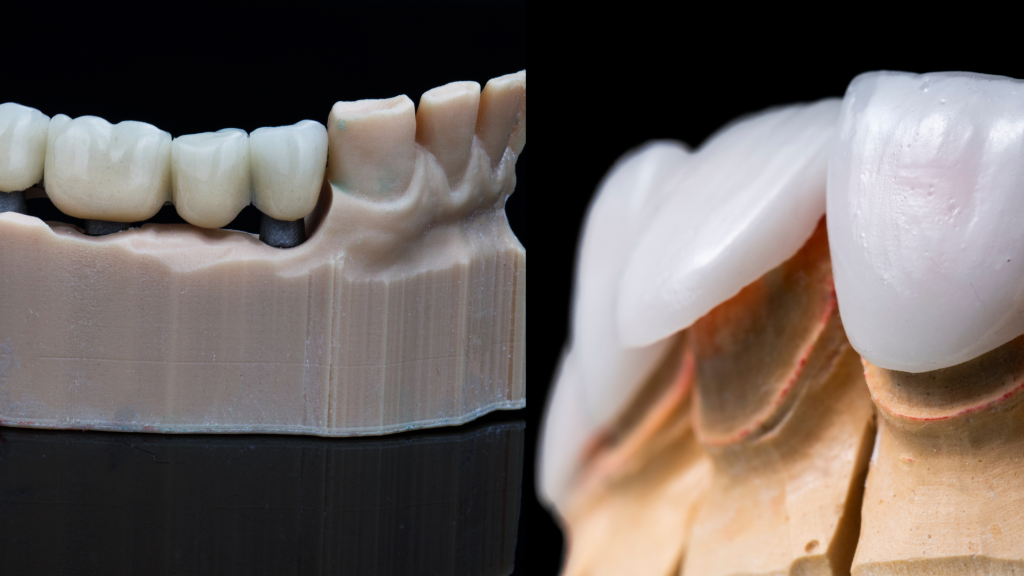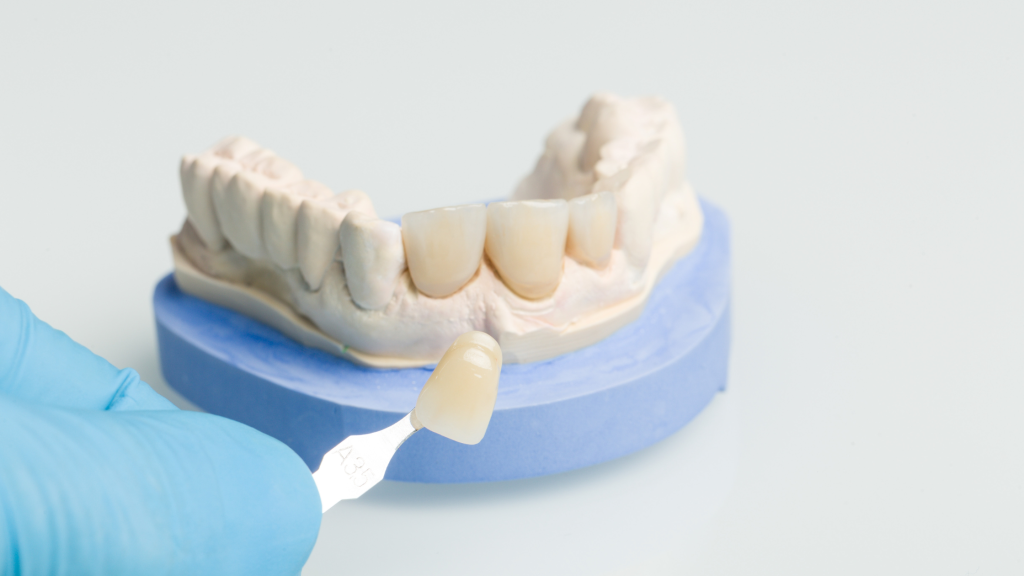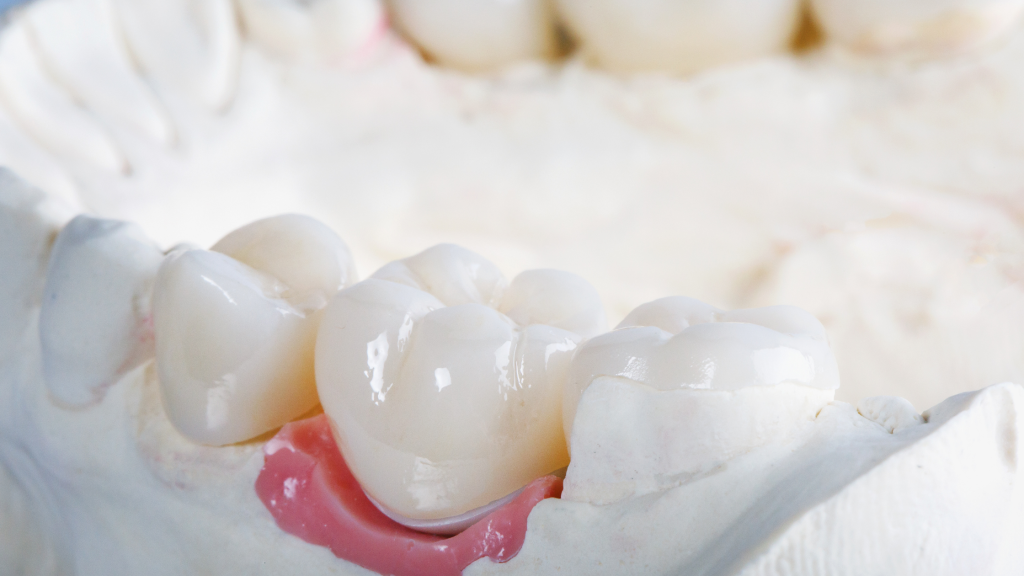Your smile is one of your most powerful assets—and thanks to modern dentistry, enhancing it is easier than ever. If you’re thinking about restoring or improving the appearance of your teeth, you’ve likely come across two popular options: dental veneers and dental crowns.

Both treatments can significantly boost the appearance and function of your teeth, but they serve different purposes and are suited to different dental issues. In this blog, we’ll break down the differences, pros and cons, and how to decide which option is best for you.
What Are Dental Veneers?

Dental veneers are ultra-thin shells made from porcelain or composite resin that are bonded to the front surface of your teeth. Think of them as custom-made covers designed to improve the colour, shape, size, or length of your teeth.
Common uses for veneers:
- Discoloured teeth that don’t respond to whitening
- Slightly crooked or uneven teeth
- Gaps between teeth
- Chipped or worn-down teeth
Types of veneers:
- Porcelain veneers: Stronger, more stain-resistant, and last longer.
- Composite veneers: More affordable and can be applied in a single visit, but less durable.
Curious about how veneers can transform your smile? Click here
What Are Dental Crowns?

A dental crown (also known as a tooth cap) completely encases the entire tooth, restoring its strength, shape, and appearance. Crowns are often used when a tooth is severely damaged or has undergone root canal treatment.
Common uses for crowns:
- Broken or cracked teeth
- Large fillings that leave the remaining tooth weak
- Teeth that have had root canal therapy
- Heavily decayed or worn teeth
- Covering dental implants
Types of crowns:
- Porcelain-fused-to-metal (PFM): Strong and tooth-coloured, but the metal base may sometimes show at the gumline.
- All-ceramic or porcelain: Best aesthetic match; ideal for front teeth.
- Zirconia: Very strong and long-lasting; often used on back teeth.
- Gold crowns: Durable but more noticeable.
Key Differences Between Veneers and Crowns
| Feature | Dental Veneers | Dental Crowns |
| Coverage | Front surface of tooth | Entire tooth |
| Purpose | Cosmetic improvements | Structural restoration and protection |
| Tooth preparation | Minimal removal of enamel | Significant reshaping of the tooth |
| Durability | 10–15 years (porcelain) | 10–20 years (depending on material) |
| Cost | Usually less expensive | Usually more expensive |
| Procedure time | 1–2 visits | 1–2 visits (may need temporary crown) |
Pros and Cons of Veneers
✔ Pros:
- Natural-looking smile
- Less invasive than crowns
- Great for minor cosmetic changes
- Stain-resistant (porcelain)
✘ Cons:
- Not suitable for weakened or heavily damaged teeth
- May not last as long if made from composite
- Can chip or crack under pressure
Pros and Cons of Crowns
✔ Pros:
- Provides full protection to damaged teeth
- Stronger and more durable
- Can restore functionality (chewing, biting)
- Can improve both appearance and oral health
✘ Cons:
- Requires more tooth structure to be removed
- More expensive than veneers
- Can sometimes cause sensitivity after placement
When Should You Choose Veneers?
You might be a good candidate for veneers if:
- Your teeth are generally healthy
- You’re looking to improve aesthetics rather than function
- You have issues like minor chips, discolouration, or gaps
- You want a more conservative treatment
Veneers are particularly popular for smile makeovers because they can create a uniform, bright, and symmetrical look.
When Should You Choose Crowns?
Crowns are ideal if:
- Your tooth is significantly weakened or cracked
- You’ve had root canal treatment
- You need to protect what’s left of your tooth
- You have severe decay or damage
Crowns not only restore function but also protect your remaining natural tooth from further issues.
How to Decide: Veneers or Crowns?
There’s no one-size-fits-all answer. Choosing between veneers and crowns depends on:
- The current health of your teeth
- The severity of the damage or concern
- Your long-term dental goals
- Budget considerations
- Your dentist’s recommendations
A comprehensive dental exam is essential. Your dentist may take X-rays and perform a thorough oral assessment to determine the right course of action.
Cost Comparison in Australia
Costs can vary depending on materials, dental clinic location, and treatment complexity.
- Porcelain veneers: $1,500 to $2,500 per tooth
- Composite veneers: $550 to $1,000 per tooth
- Crowns: $1,700 to $2,500 per tooth
While crowns are generally more expensive, they offer added protection and may last longer with proper care.
Are Veneers or Crowns Covered by Insurance?
In Australia, most health funds don’t cover cosmetic treatments, which means porcelain veneers are often out-of-pocket expenses. However, if a crown is needed for medical reasons (e.g., following a root canal), part of the cost may be covered under major dental benefits in your policy.

It’s best to check with your health fund provider and ask your dentist for a treatment plan to see what rebates may apply.
Caring for Your Veneers or Crowns
Good oral hygiene is key to getting the most out of your investment.
- Brush twice a day with a soft-bristled toothbrush
- Floss daily
- Avoid biting hard objects (e.g., ice, pens, fingernails)
- Limit stain-causing foods and drinks
- Visit your dentist regularly for check-ups and cleans
Even though the materials are strong, the tooth underneath can still develop decay or gum disease if not properly cared for.
Final Thoughts: It’s About What’s Right for You
When it comes to your smile, both veneers and crowns offer transformative results, but they serve different purposes. Veneers are ideal for cosmetic tweaks, while crowns are better for restoring strength and function to damaged teeth.
At U Smile Dental Club, we take the time to understand your smile goals and guide you through every option. Whether you’re dreaming of a picture-perfect smile or need to restore a tooth that’s seen better days, we’re here to help you make the best decision for your oral health.
U-Smile Dental Club in Box Hill, NSW, provides general, cosmetic, and emergency dental services in a calm, judgment-free setting. Their team focuses on patient comfort with features like soft lighting and sedation options. Services include check-ups, fillings, Invisalign, veneers, and teeth whitening. Flexible payment plans and special offers are also available for new patients.



